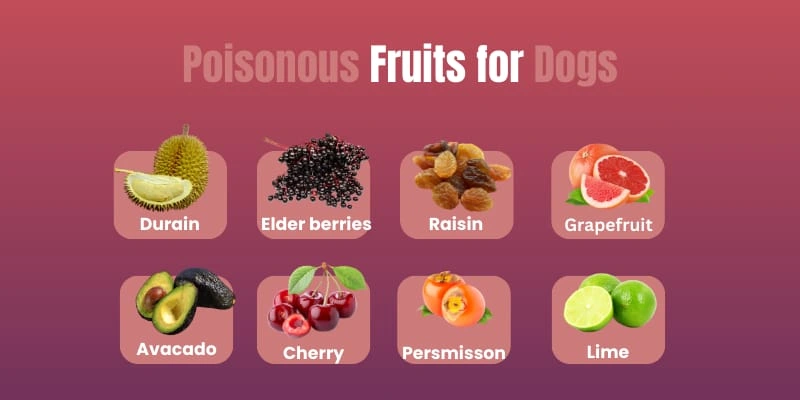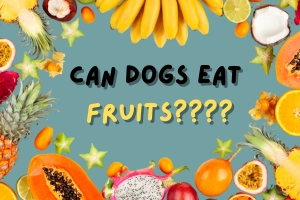Poisonous Fruits for Dogs: Learn What to Keep Away
Published: 4 Nov 2024
Hey guys!
Worried about what fruits could harm your dog? Many dog owners face this confusion when it comes to feeding their pets fresh fruit. The truth is that some fruits can be extremely toxic, leading to serious health issues. Understanding which fruits are poisonous for dogs is crucial to keeping your furry friend safe and healthy.
In this article, we’ll explore the most common poisonous fruits for dogs, the symptoms of fruit poisonings in dogs, and the safe alternatives you can offer instead. By the end, you’ll be well-informed and ready to make the best choices for your dog’s diet.
So, let’s dive in and ensure your pup stays happy and healthy!
Why Certain Fruits Can Be Toxic To Dogs?
Fruits that are healthy treats for us can cause illness or death in our dogs. It sounds strange. Let’s uncover what makes these fruits poisonous:
| Toxic Fruits for Dogs: What Makes Them Harmful? |
|---|
|
Common Poisonous Fruits
As pet owners, it’s our duty to identify all foods that are toxic for our dogs, including fruits, vegetables, dairy, nuts, or grains. Here is a list of some of the most common fruits that can be harmful to dogs:
- Grapes and Raisins
- Cherries and Damsons
- Avocado
- Citrus fruits (like lemons, limes, and grapefruit)
- Elderberries
- Durians

Let’s explore why these fruits are toxic and what damage they cause!
Grapes and Raisins:
Grapes are a popular snack for humans but can be highly toxic to dogs. Even though the specific substance that causes toxicity in dogs is still unidentified, their ingestion can lead to sudden kidney failure, which can occur within hours.
Symptoms of Grape Toxicity
If a dog eats grapes, you may notice the following symptoms:
- Vomiting
- Diarrhea
- Loss of Appetite
- Lethargy
- Abdominal Pain
Contact your vet immediately if you suspect your dog has eaten grape or raisin. Early treatment increases the chances of a full recovery.
| Intersting Facts |
|---|
|
Cherries and Damsons
Dogs cannot eat cherries and damsons because they are toxic. While the flesh of the cherry and damsons might not be toxic, the pits, skin, and leaves are dangerous. They contain cyanogenic glycosides, which release cyanide when chewed or ingested.
Cyanide blocks oxygen transport in the blood, leading to symptoms like difficulty breathing, red gums, and, in severe cases, organ failure. Also, the hard pits in cherries can easily get stuck in a dog’s throat, especially in smaller breeds. This can cause choking or injuries to the digestive tract.
Symptoms of Cherry Toxicity
In case of any accidental eating of cherries, you have to look for these symptoms of toxicity:
- Vomiting
- Diarrhea
- Difficulty Breathing
- Lethargy
- Abdominal Pain
A single cherry pit is unlikely to cause cyanide poisoning in larger dogs, but multiple pits or smaller dogs are at higher risk.
Avocado
Avocados are one of the most dangerous fruits for dogs. While the flesh of an avocado is safe in small amounts, the pit, skin, and leaves are really dangerous. Persin can cause damage to the heart muscle, leading to fluid buildup around the heart (known as myocardial congestion).
High amounts of persin may affect lung function, and the pit presents a choking hazard and can cause digestive blockages if swallowed.
Symptoms of Avocado Toxicity
Here’s the list of symptoms your dog will show after eating avocado:
- Vomiting
- Diarrhea
- Stomach upset
- Difficulty breathing (in severe cases)
- Fluid accumulation around the heart or lungs
- Abdominal pain
- Lack of appetite
- Weakness or lethargy
If you suspect any symptoms after your dog ingests avocado, consult your veterinarian immediately to prevent severe damage.
Citrus Fruits
Did you know dogs cannot eat citrus fruits like lemons, limes, grapefruits, oranges? Citrus fruits contain essential oils like limonene and linalool, which can cause central nervous system depression. These oils are found in the skin, leaves, and seeds of citrus fruits.
The high citric acid and Psoralen (a chemical compound found in the peel and seeds of citrus fruits) can irritate a dog’s digestive system, leading to stomach issues or discomfort. Psoralen can also cause photosensitivity, making the dog’s skin more susceptible to sunburn.
Symptoms of Citrus Fruit Toxicity
Here’s the list of symptoms your dog might show after consuming citrus fruits:
- Vomiting
- Diarrhea
- Drooling
- Trembling or shaking (in severe cases)
- Skin irritation (if exposed to the oils)
- Weakness
- Depression or lethargy
If your dog ingests citrus fruits, it’s best to monitor them and contact a vet if any symptoms appear.

Elderberries
Elderberries have rich antioxidant properties, but dogs cannot eat them. Raw elderberries and the plant’s leaves, stems, and roots contain cyanogenic glycosides, which can produce cyanide when consumed. This toxin can cause serious symptoms ranging from digestive upset to respiratory and neurological issues.
Symptoms of Elderberry Toxicity
Here’s the list of symptoms your dog might show after consuming elderberries or any part of the plant:
- Vomiting
- Diarrhea
- Difficulty breathing
- Excessive drooling
- Seizures (in severe cases)
- Weakness or lethargy
- Coma (in extreme cases of poisoning)
Ripe elderberries contain much lower levels of cyanogenic glycosides, but if consumed in large amounts, they can still cause stomach upset or mild poisoning.
Durains:
Durians are dangerous for dogs due to their high-fat content in the flesh. High fat can lead to pancreatitis, an inflammation of the pancreas. They also contain a lot of natural sugars, which can lead to weight gain, obesity, or even contribute to conditions like diabetes in dogs.
Dogs are not accustomed to high-sugar and high-fat foods, so eating durian can cause gastrointestinal distress.
Durian seeds are large and hard, posing a significant risk of choking or intestinal blockages if swallowed by a dog. If a seed gets lodged in the digestive tract, surgical intervention may be required to remove the obstruction.
Symptoms of Durain Toxicity
If a dog consumes durian, they may exhibit the following symptoms:
- Vomiting or diarrhea
- Abdominal pain or bloating
- Choking (if a seed is ingested)
- Constipation or signs of intestinal blockage (e.g., straining without results)
- Lethargy or lack of appetite
To keep your dog safe, it’s best to avoid sharing durian altogether.
What Should You Do If Your Dog Eats Toxic Fruits?
If your dog accidentally eats a toxic fruit, it’s essential to act quickly and calmly. Some fruits can cause mild symptoms, while others can lead to serious health issues. Always consult a veterinarian if your dog has consumed a toxic fruit.
Here are the steps you should take:
- If your dog eats something toxic, act quickly.
- Identify what they ate, how much, and when, and check for symptoms like vomiting, diarrhea, drooling, or seizures.
- Contact your veterinarian or a poison control hotline, such as ASPCA (+1-888-426-4435). Provide all details and follow their advice.
- Do not induce vomiting or give home remedies unless specifically instructed, as some substances can cause more harm.
- If needed, take your dog to the vet immediately, bringing the toxic item or its packaging.
If your dog eats toxic fruits, following these steps can help ensure its safety and health. Quick action can make a significant difference in its recovery.
How do We Prevent Dogs from Eating Toxic Fruits?
Preventing dogs from eating toxic fruits is essential for their health. Here are some effective ways to keep your dog safe:
| Prevent Dogs from Eating Toxins |
|---|
|
Safe Alternatives to Poisonous Fruits
Here are some safe alternatives to poisonous fruits that you can offer your dog:
- Apples: Apples are a great source of vitamins A and C and fiber.
- Blueberries: These small berries are packed with antioxidants and are low in calories.
- Bananas: Rich in potassium and vitamins, bananas make a tasty treat. However, due to their high sugar content, they should be consumed in moderation.
- Watermelon: Watermelon is hydrating and low in calories.
- Strawberries: These are full of fiber and vitamin C. They can help whiten your dog’s teeth as well.
You can treat your dog by offering these safe fruit alternatives while ensuring their health and safety!
Conclusion:
Ok, Guys! Now, you are completely aware that knowing about poisonous fruits for dogs, including grapes, raisins, avocadoes, and citric fruits, is vital for keeping your furry friend safe and healthy.
I recommend replacing toxic fruits with safe options like apples, blueberries, and bananas, which provide great nutrition without the risk. So, check your kitchen and garden for harmful fruits and keep them out of reach of your pet.
Ensure your dog enjoys only safe and delicious treats!
If you found this information helpful or have any experiences to share about keeping your dog safe from poisonous fruits, please leave a comment below! Your insights could help other dog owners make informed choices for their pets.
FAQs
Let’s discuss some frequently asked questions about poisonous fruits for dogs.
Watch for symptoms such as vomiting, diarrhea, lethargy, difficulty breathing, or unusual behavior. If you notice any of these signs after your dog eats a fruit, contact your vet right away. Quick action can make a big difference in their recovery.
Yes, even small amounts of toxic fruits can potentially harm dogs. The severity of illness depends on the type of fruit, the amount ingested, and the dog’s individual sensitivity.
Fruit juice is not recommended for dogs because it often contains added sugars and acids that can upset their stomach. Additionally, many fruit juices may contain toxic ingredients like citric acid or preservatives. It’s better to offer whole fruits in moderation instead.
It depends on the fruit. Some fruit skins, like apples, are safe and nutritious for dogs, while others, like avocado skin, can be harmful. Always research the specific fruit and remove the skin if it’s known to be toxic.
Frozen fruits, like blueberries or watermelon chunks, can be safe and refreshing treats for dogs. Just ensure the fruit is safe for dogs and contains no added sugars or preservatives. Always supervise your dog while they enjoy frozen treats to prevent choking.

- Be Respectful
- Stay Relevant
- Stay Positive
- True Feedback
- Encourage Discussion
- Avoid Spamming
- No Fake News
- Don't Copy-Paste
- No Personal Attacks

- Be Respectful
- Stay Relevant
- Stay Positive
- True Feedback
- Encourage Discussion
- Avoid Spamming
- No Fake News
- Don't Copy-Paste
- No Personal Attacks





